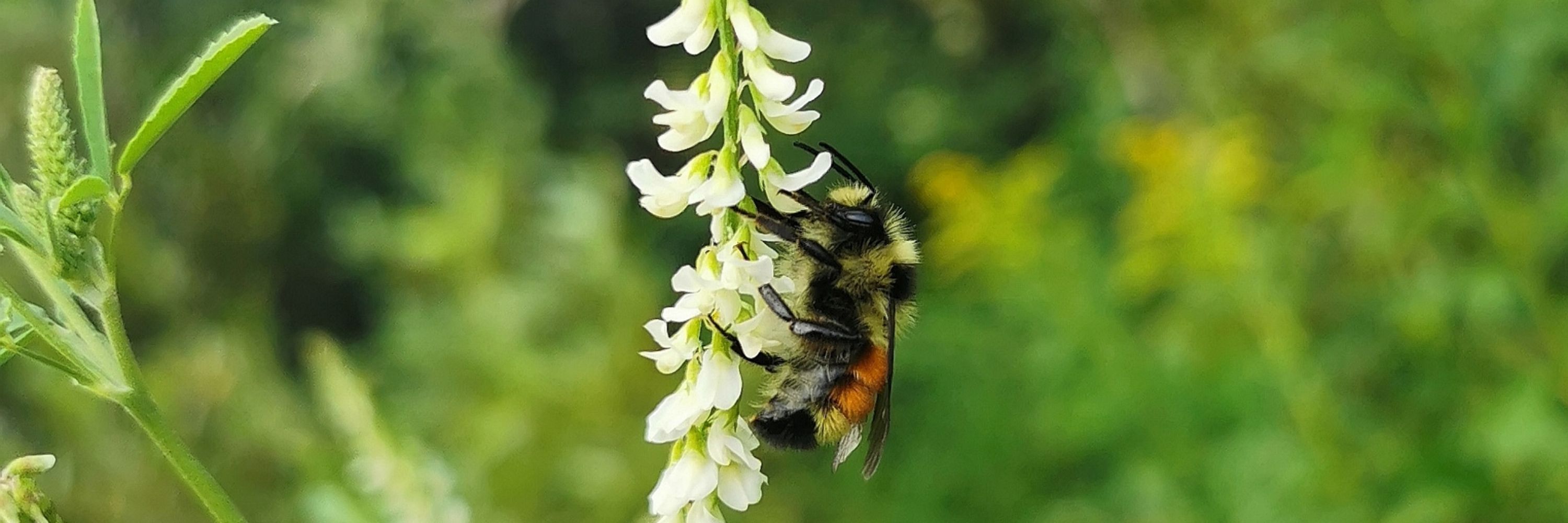
Mathilde L. Tissier
@mathildetissier.bsky.social
Scientist, passionate about life, wildlife & vitamin B3! | Conservation, biodiversity, nutrition, agroecology, behavior, health |
Liber Ero (CA), CNRS researcher (FRA), QCBS & adjunct prof. UQÀM (QC) | She/her FR/EN | 🐿️🍁🐝🌻🌾
https://www.sppb-sffb.net/
Liber Ero (CA), CNRS researcher (FRA), QCBS & adjunct prof. UQÀM (QC) | She/her FR/EN | 🐿️🍁🐝🌻🌾
https://www.sppb-sffb.net/
Namely, we highlight how to integrate 1) the non-linear interactions between multiple environmental stressors (e.g. heat stress, malnutrition, pesticide exposure); 2) the ecological consequences of pesticide transformation products, which can have lethal and sublethal effects on many organisms.
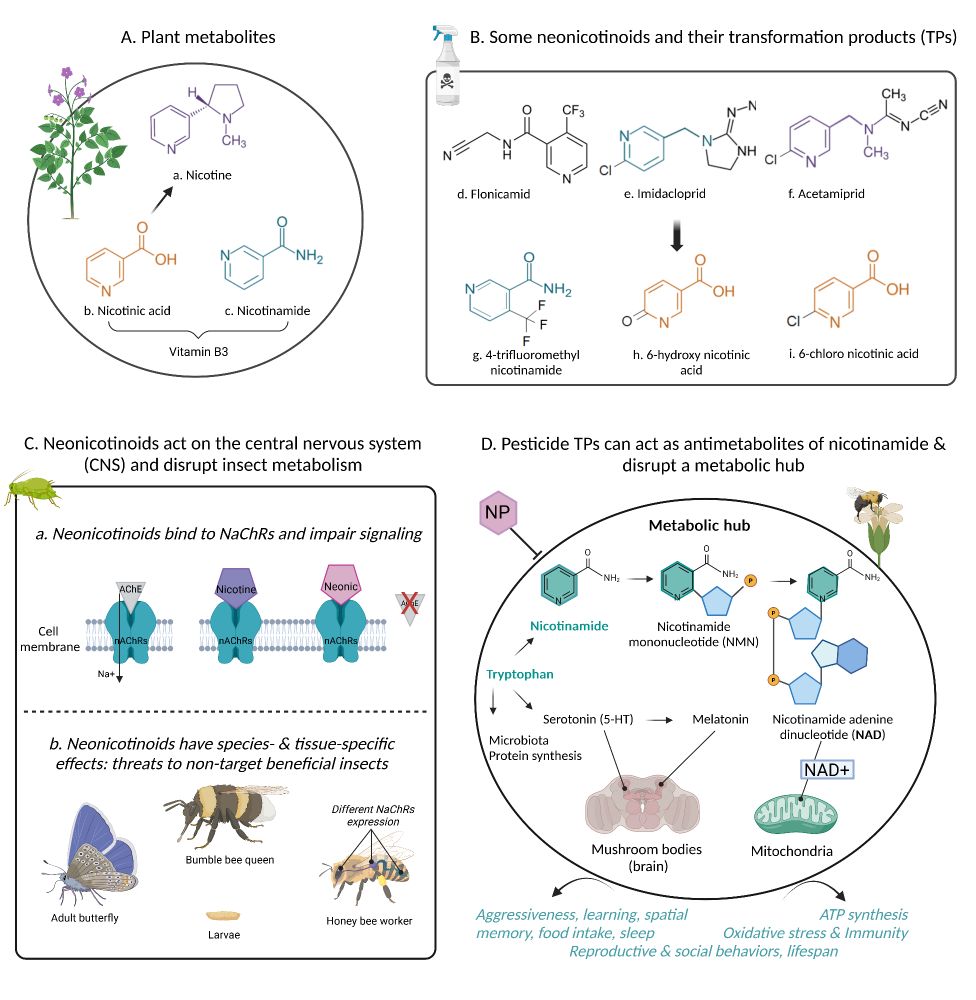
April 22, 2025 at 2:23 PM
Namely, we highlight how to integrate 1) the non-linear interactions between multiple environmental stressors (e.g. heat stress, malnutrition, pesticide exposure); 2) the ecological consequences of pesticide transformation products, which can have lethal and sublethal effects on many organisms.
In this opinion piece, we synthetize the ecological and evolutionary complexities of pesticide exposure in the context of global change and propose a holistic approach for environmental risk assessments.
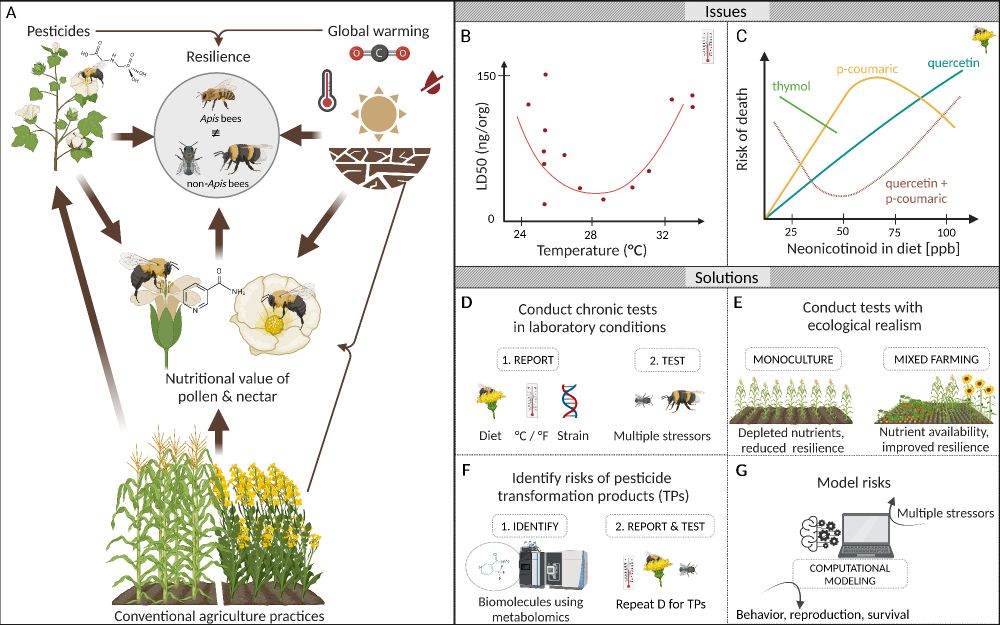
April 22, 2025 at 2:23 PM
In this opinion piece, we synthetize the ecological and evolutionary complexities of pesticide exposure in the context of global change and propose a holistic approach for environmental risk assessments.
Out now in @globalchangebio.bsky.social: "Pesticide Risk Assessment in a Changing World"
Our climate is changing, and biodiversity is declining. In this context, accurate pesticide risk assessments to insect pollinators and crop auxiliaries -pivots of food security in a changing world- is crucial.
Our climate is changing, and biodiversity is declining. In this context, accurate pesticide risk assessments to insect pollinators and crop auxiliaries -pivots of food security in a changing world- is crucial.
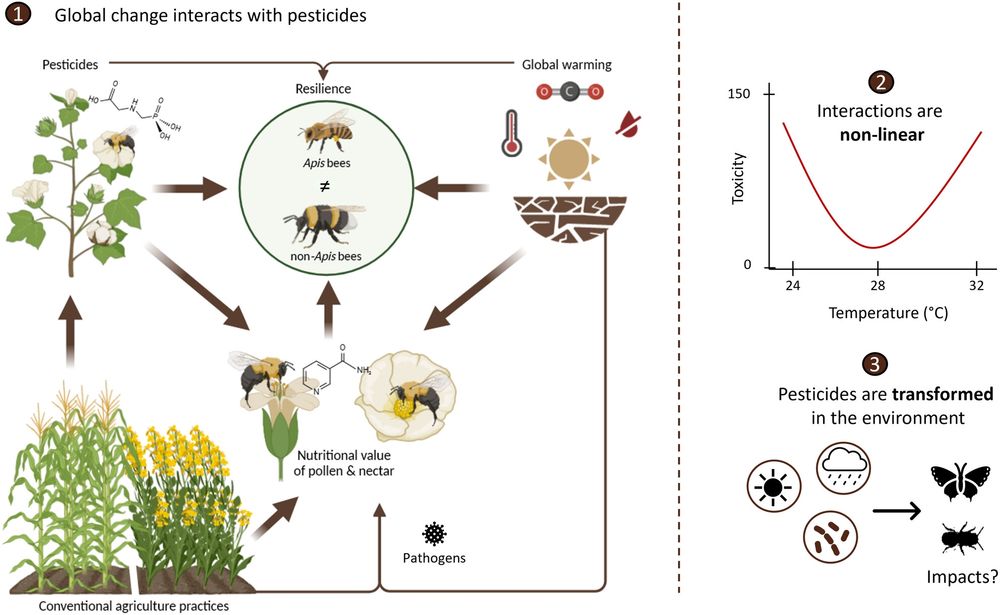
April 22, 2025 at 2:23 PM
Out now in @globalchangebio.bsky.social: "Pesticide Risk Assessment in a Changing World"
Our climate is changing, and biodiversity is declining. In this context, accurate pesticide risk assessments to insect pollinators and crop auxiliaries -pivots of food security in a changing world- is crucial.
Our climate is changing, and biodiversity is declining. In this context, accurate pesticide risk assessments to insect pollinators and crop auxiliaries -pivots of food security in a changing world- is crucial.
In this opinion piece, we synthetize the ecological and evolutionary complexities of pesticide exposure in the context of global change and propose a holistic approach for environmental risk assessments.

April 22, 2025 at 2:19 PM
In this opinion piece, we synthetize the ecological and evolutionary complexities of pesticide exposure in the context of global change and propose a holistic approach for environmental risk assessments.
Out now in @globalchangebio.bsky.social: "Pesticide Risk Assessment in a Changing World"
Our climate is changing, and biodiversity is declining. In this context, accurate pesticide risk assessments to insect pollinators and crop auxiliaries -pivots of food security in a changing world- is crucial.
Our climate is changing, and biodiversity is declining. In this context, accurate pesticide risk assessments to insect pollinators and crop auxiliaries -pivots of food security in a changing world- is crucial.

April 22, 2025 at 2:19 PM
Out now in @globalchangebio.bsky.social: "Pesticide Risk Assessment in a Changing World"
Our climate is changing, and biodiversity is declining. In this context, accurate pesticide risk assessments to insect pollinators and crop auxiliaries -pivots of food security in a changing world- is crucial.
Our climate is changing, and biodiversity is declining. In this context, accurate pesticide risk assessments to insect pollinators and crop auxiliaries -pivots of food security in a changing world- is crucial.
Un résumé en français de cette étude sur les risques des pesticides, comme les néonicotinoïdes, pour les abeilles sauvages - par le @cnrs.bsky.social
www.inee.cnrs.fr/fr/cnrsinfo/...
www.inee.cnrs.fr/fr/cnrsinfo/...

November 22, 2024 at 3:04 PM
Un résumé en français de cette étude sur les risques des pesticides, comme les néonicotinoïdes, pour les abeilles sauvages - par le @cnrs.bsky.social
www.inee.cnrs.fr/fr/cnrsinfo/...
www.inee.cnrs.fr/fr/cnrsinfo/...
Recommendations: We propose three recommendations to help scientists, policy-makers, and regulatory agencies to protect biodiversity, namely 1) Develop toxicity assays for non-Apis bees, 2) Prioritize chronic toxicity studies, and 3) Collect genetic & environmental data.

November 22, 2024 at 2:59 PM
Recommendations: We propose three recommendations to help scientists, policy-makers, and regulatory agencies to protect biodiversity, namely 1) Develop toxicity assays for non-Apis bees, 2) Prioritize chronic toxicity studies, and 3) Collect genetic & environmental data.
🔎 Main Findings: This variation highlights the limitations of current risk assessments, emphasizing the necessity for a more comprehensive approach to pesticide regulation. Our study sheds light on the urgent need to protect wild #pollinators from #pesticide harm

November 22, 2024 at 2:59 PM
🔎 Main Findings: This variation highlights the limitations of current risk assessments, emphasizing the necessity for a more comprehensive approach to pesticide regulation. Our study sheds light on the urgent need to protect wild #pollinators from #pesticide harm
🔎 Main Findings: Our meta-analysis of #neonicotinoid toxicity data unveils considerable variation in LD50 among #honeybees & #wildbees, up to six orders of magnitude. Surrogate species like honey bees don’t adequately represent risks to wild #pollinators

November 22, 2024 at 2:59 PM
🔎 Main Findings: Our meta-analysis of #neonicotinoid toxicity data unveils considerable variation in LD50 among #honeybees & #wildbees, up to six orders of magnitude. Surrogate species like honey bees don’t adequately represent risks to wild #pollinators
Our latest paper in @consletters.bsky.social with R. Shahmohamadloo and M. Guzman on underestimated risks of pesticides, like neonicotinoids, to wild bees 🐝
t.co/nOWrPdIiBN
t.co/nOWrPdIiBN
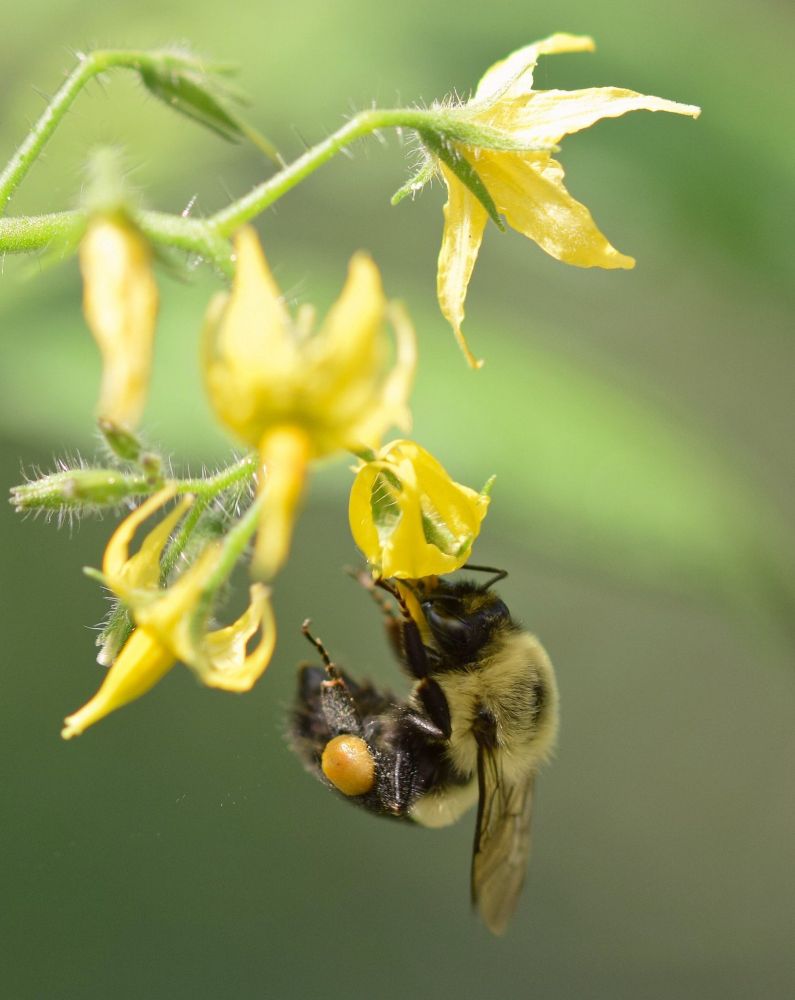
November 22, 2024 at 2:59 PM
Our latest paper in @consletters.bsky.social with R. Shahmohamadloo and M. Guzman on underestimated risks of pesticides, like neonicotinoids, to wild bees 🐝
t.co/nOWrPdIiBN
t.co/nOWrPdIiBN


